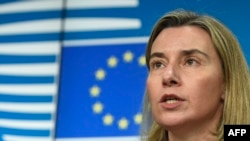EU extends sanctions against Russia through July 2017
| Publisher | Radio Free Europe/Radio Liberty |
| Publication Date | 19 December 2016 |
| Cite as | Radio Free Europe/Radio Liberty, EU extends sanctions against Russia through July 2017, 19 December 2016, available at: https://www.refworld.org/docid/5975a379d.html [accessed 1 June 2023] |
| Disclaimer | This is not a UNHCR publication. UNHCR is not responsible for, nor does it necessarily endorse, its content. Any views expressed are solely those of the author or publisher and do not necessarily reflect those of UNHCR, the United Nations or its Member States. |
December 19, 2016
 EU foreign-policy chief Federica Mogherini delivers a press briefing at an EU-Ukraine Association Council at the EU headquarters in Brussels on December 19.
EU foreign-policy chief Federica Mogherini delivers a press briefing at an EU-Ukraine Association Council at the EU headquarters in Brussels on December 19.
BRUSSELS – The European Union has extended sanctions against Russia for its actions in Ukraine for another six months.
The European Council formally approved the extension on December 19 after EU leaders agreed to the move at a summit last week.
"The council prolonged the economic sanctions targeting specific sectors of the Russian economy until July 31, 2017," the council said in a statement.
The sanctions target the financial, energy, and defense sectors and material that can be used for both industrial and military means.
Last week, German Chancellor Angela Merkel and French President Francois Hollande voiced support for prolonging the sanctions.
They faulted Moscow for failing to do its part in implementing the Minsk accords – a February 2015 agreement aimed at ending the conflict in eastern Ukraine, where more than 9,750 people have died since April 2014 in fighting between Russia-backed separatists and Ukrainian forces.
While agreement on the extension was reached with little trouble by the 28-member EU, supporters of the sanctions fear it could be far harder to prolong them again next summer, even if there is little progress toward implementation of the Minsk accords.
That is in part due to the impending exit of Britain, which has supported the measures, as well as opposition to the sanctions in some other countries and uncertainty about the U.S. stance after President-elect Donald Trump – who has vowed to seek to improve relations with Russia – takes office in January.
Meanwhile, French voters appear likely to elect a president who is less critical of Russia than Hollande in an election in the spring.
With reporting by RFE/RL's Brussels correspondent Rikard Jozwiak
Link to original story on RFE/RL website
